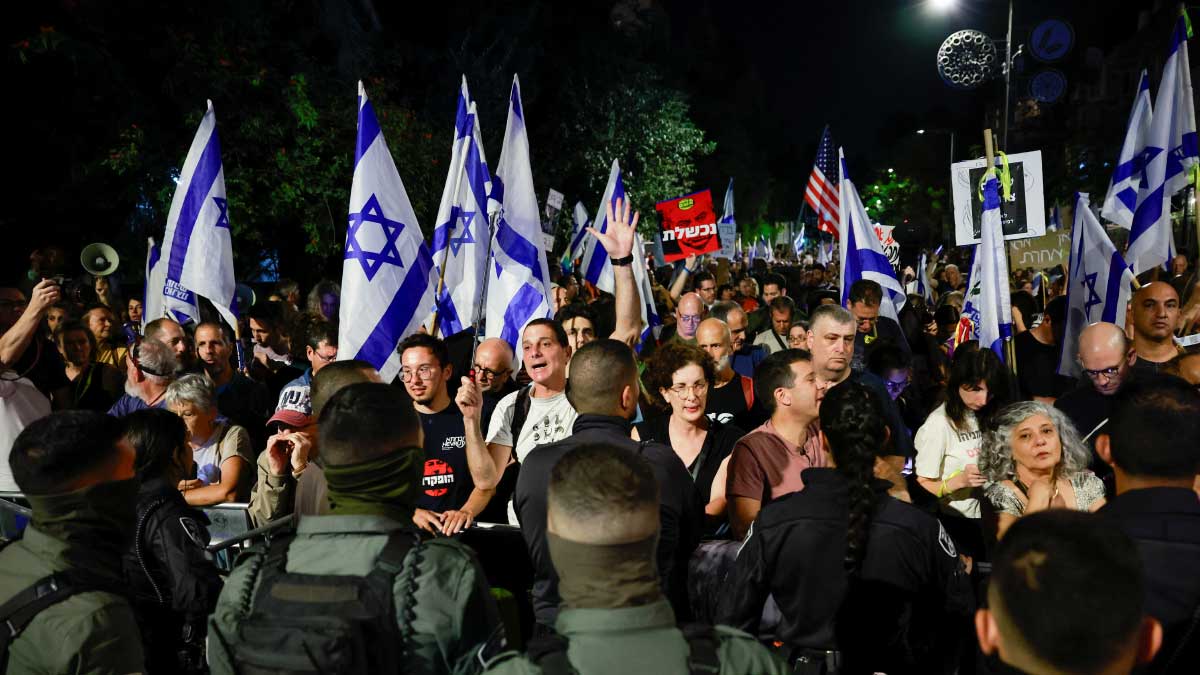- Home
- Billionaires
- Investing Newsletters
- 193CC 1000
- Article Layout 2
- Article Layout 3
- Article Layout 4
- Article Layout 5
- Article Layout 6
- Article Layout 7
- Article Layout 8
- Article Layout 9
- Article Layout 10
- Article Layout 11
- Article Layout 12
- Article Layout 13
- Article Layout 14
- Article Sidebar
- Post Format
- pages
- Archive Layouts
- Post Gallery
- Post Video Background
- Post Review
- Sponsored Post
- Leadership
- Business
- Money
- Small Business
- Innovation
- Shop
Recent Posts
Nationwide Strike Hits Israel After Protests Demand Hostage Deal

A significant labor strike commenced in Israel on Monday, marking a pivotal moment in the ongoing hostage crisis with Hamas. This nationwide strike follows a night of unprecedented mass protests, driven by public outrage over the tragic deaths of six hostages recently held by the militant group. The strike, organized by Histadrut, Israel’s largest labor union, is a direct response to the perceived inaction of the Israeli government regarding negotiations for a hostage release deal.
Histadrut’s chair, Arnon Bar-David, has been vocal about the urgency of securing a deal for the hostages. He underscored that achieving this deal is “more important than anything else,” and he has criticized the government for prioritizing “political considerations” over the immediate need to save the lives of those still in captivity. The strike, which has been called for one day, has had a profound impact across various sectors. Hospitals throughout the country are functioning at a limited weekend capacity, significantly affecting patient care and medical services. The main international airport in Israel has also been closed to most departures since 8:00 a.m. local time, causing disruptions for travelers and impacting international connections. Other sectors such as banking and local transportation are similarly affected, illustrating the broad reach of the strike’s impact.
The catalyst for this strike was a series of massive protests that erupted on Sunday night. Hundreds of thousands of Israelis took to the streets in major cities to demand that the government agree to a cease-fire and facilitate the release of all remaining hostages held by Hamas in Gaza. In Jerusalem, thousands of demonstrators assembled in front of Prime Minister Benjamin Netanyahu’s office, voicing their frustration and demanding action. In Tel Aviv, protesters carried coffins through the streets to symbolize the recent deaths of the hostages, highlighting the gravity of the situation and the perceived failure of the government to protect its citizens.
Prime Minister Netanyahu is facing mounting criticism both from the public and within his own government. Defense Minister Yoav Gallant has publicly criticized the Israeli military’s ongoing presence along the Gaza-Egypt border, which has become a significant point of contention in the cease-fire negotiations. This criticism adds another layer of complexity to Netanyahu’s position, as he must navigate both internal dissent and external pressures while attempting to manage the crisis.
In his address on Sunday, Netanyahu condemned the killings of the hostages with strong rhetoric, stating, “Whoever murders hostages does not want a deal. Whoever murdered the hostages has blood on their hands. We will pursue you, we will find you and we will settle accounts with you.” His statements reflect the intensity of the situation and the government’s determination to seek justice for the victims and their families.
The Israeli Defense Forces (IDF) reported on Saturday that they had recovered the bodies of six hostages from Gaza. Among them was 23-year-old U.S. national Hersh Goldberg-Polin. The hostages were found in a tunnel beneath Rafah and were discovered to have been killed shortly before their bodies were recovered. Forensic examinations revealed that the hostages had been shot at close range, underscoring the brutality of their deaths. President Joe Biden expressed deep sorrow and outrage over Goldberg-Polin’s death, condemning the actions of Hamas as “tragic” and “reprehensible.” Biden vowed that Hamas’ leader would face repercussions for these crimes and reaffirmed his administration’s commitment to working tirelessly to secure the release of the remaining hostages.
The protests on Sunday night were among the largest Israel has witnessed since the onset of the Gaza conflict. Demonstrators have directed their anger at Netanyahu, accusing him of obstructing efforts to achieve a cease-fire and secure a hostage release deal for personal or political gain. The Hostages and Missing Families Forum, which represents the relatives of some of the hostages, has harshly criticized Netanyahu and his government, asserting that their actions effectively sealed the fate of the deceased hostages. The forum’s members argue that the hostages could have been saved had the government agreed to the proposed deal, further intensifying public dissatisfaction and demand for a resolution.
The strike and protests highlight a critical juncture in the ongoing conflict, reflecting a nation deeply divided over the handling of the crisis and the role of the government in negotiating for the hostages’ release. As the situation continues to develop, the pressure on Israeli leadership to find a resolution and address public concerns will likely increase, with significant implications for both domestic stability and international relations.
Recent Posts
Categories
- 193cc Digital Assets2
- 5G1
- Aerospace & Defense46
- AI37
- Arts3
- Banking & Insurance11
- Big Data3
- Billionaires449
- Boats & Planes1
- Business328
- Careers13
- Cars & Bikes76
- CEO Network1
- CFO Network17
- CHRO Network1
- CIO Network1
- Cloud10
- CMO Network18
- Commercial Real Estate7
- Consultant1
- Consumer Tech180
- CxO1
- Cybersecurity68
- Dining1
- Diversity, Equity & Inclusion4
- Education7
- Energy8
- Enterprise Tech29
- Events11
- Fintech1
- Food & Drink2
- Franchises1
- Freelance1
- Future Of Work2
- Games141
- GIG1
- Healthcare78
- Hollywood & Entertainment186
- Houses1
- Innovation42
- Investing2
- Investing Newsletters4
- Leadership65
- Lifestyle11
- Manufacturing1
- Markets20
- Media193
- Mobile phone1
- Money13
- Personal Finance2
- Policy567
- Real Estate1
- Research6
- Retail1
- Retirement1
- Small Business1
- SportsMoney33
- Style & Beauty1
- Success Income1
- Taxes2
- Travel10
- Uncategorized8
- Vices1
- Watches & Jewelry2
- world's billionaires418
Related Articles
Trump Moves $4B Stake in Truth Social Parent, Stock Drops 6%
Donald Trump recently transferred his 57% stake in Trump Media & Technology...
By 193cc Agency CouncilDecember 20, 2024House Rejects Trump-Backed Funding Bill, Shutdown Looms
The U.S. House of Representatives rejected a new government funding bill on...
By 193cc Agency CouncilDecember 20, 2024Trump Named Time’s Person of the Year for Second Time
On Thursday, Time magazine honored Donald Trump as its “Person of the...
By 193cc Agency CouncilDecember 12, 2024Meta Donates $1 Million to Trump’s Inaugural Fund
Meta, the parent company of Facebook and Instagram, has confirmed a $1...
By 193cc Agency CouncilDecember 12, 2024















Leave a comment